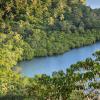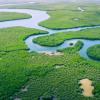
The RESIST project has made significant progress through active collaboration with IIASA's National Member Organizations (NMO). Key recent achievements include setting up collaborations with national researcher partners and consulting with local experts and stakeholders in respective case study regions (listed below).
For the Indian case study, we have identified specific research objectives focused on conservation and restoration of biodiversity. To this end, we have conducted local field campaigns in collaboration with local stakeholders and set up a network of data collection sites for which data on vegetation structure and forest dynamics have been elaborated in collaboration with local research partners.
For the Israel case study, despite of delays due to regional instability, an agreement on data sharing for PlantFATE model calibration has been established and will be finalized post-2024.
For the Brazil/UK case study, first measurement data available from the Amazon FACE site have been used for model calibration and preliminary results have been published in the Ecological Modelling journal.
For China, a call by the national natural science foundation of China (NSFC) has led to the elaboration of several research proposals, of which one led by IBF researcher Jinfeng Chang on ecosystem stability and resilience has been selected for funding.
These developments highlight recent advances in research on ecological modeling and conservation and further underscore the project's ongoing success in establishing collaborations with international research partners. For further details on specific research conducted in respective work package please also see the associated articles published on the IIASA NEXUS blog:
- Upcoming project fusing ground observations, remote sensing and modeling of vegetation dynamics in the Austrian rainforest, Costa Rica (https://iiasa.ac.at/blog/feb-2024/rainforest-gets-digital-twin)
- The Plant Functional Acclimation and Trait Evolution (PlantFATE) vegetation model (https://iiasa.ac.at/blog/nov-2022/how-do-droughts-affect-ability-of-trees-to-absorb-co2)
- Inaugurating RESIST at the Association for Tropical Biology and Conservation (https://iiasa.ac.at/blog/sep-2022/achieving-socio-ecological-resilience-in-anthropocene-opportunities-and-challenges)
News

22 August 2024
Meeting ambitious restoration targets in Brazil’s Atlantic Forest

29 November 2023
Embracing ecological perspectives, tools, and models to navigate the digital economy

27 November 2023